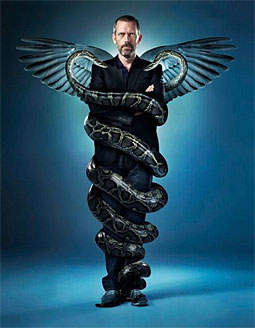House Snake
Interesting stuff from James Jordan’s Trees and Thorns: A Commentary on Genesis 2-4
.
“…swarmers-creepers are described as creatures that break the boundaries of human life and invade the human house, defiling the house.”The first two of the four curses upon the serpent are found in Genesis 3:14. Only the serpent is directly cursed, and the word You is emphatic in Hebrew. The man and the woman are not cursed directly, but mediately through the soil, an important distinction that we shall address in due course.
English Bibles render the first phrase, “Cursed are you more than, or above, all the other animals.” Yet in fact the other animals are not cursed at all, so there is a problem, and the problem is in the translation. There are several words for curse in Hebrew, and unfortunately our English Bibles wind up translating all of them with the one word “curse.” The word here, ‘arur, means, “banish, separate,” in the sense of being isolated from what is good. To curse a person in this sense is to wish that he be cut off from God and from the covenant and from all the good things of the covenant. The meaning here is that the serpent is isolated from or banished from being part of the cattle and the beasts of the field. Originally, the serpent was one of the beasts of the field (3:1). Now he is cut out from that category. He is not repositioned among the cattle, but among the creeping things. Genesis 1:24-26 identified these three categories. Cattle are the domestic animals that live with human beings. Beasts of the field are wild, free, undomesticated animals. Creeping things crawl along the ground, and now the serpent is put with them: He will crawl on his belly. (The statement, “On your belly you shall go,” does not go with the next phrase about eating dust, but with the preceding phrases about being banished from being among the beasts of the field.)
In Leviticus 11 the character of swarmers-creepers is fleshed out. The chapter begins by distinguishing clean and unclean cattle and beasts of the field, fishes, birds, and hopping insects. In verse 29, attention is called to the larger swarming-crawling creatures. These are described as creatures that break the boundaries of human life and invade the human house, defiling the house. This is precisely what the serpent did in Genesis 3, for as a beast of the field he did not belong in the garden uninvited, as we saw when we dealt with Genesis 2:19-20 (to wit: the cattle are not brought into the garden because they were already there). The serpent crossed the boundary and brought uncleanness (which is symbolic death). The list of eight big swarmers in Leviticus 11:29 mentions mole and mouse and then six serpents.
These animals move on their belly. The word for “belly” here occurs only one other place, Leviticus 11:42. It is not the word for stomach, also translated “belly” in some English Bibles, but a word that means the bottom part of the animal’s abdomen.
Another aspect of this curse is that the serpent loses his name. Adam had named the birds, the domestic animals, and the wild animals, but not the fishes and not the crawlers. By putting the serpent in with the crawlers, the serpent moves into the lower category of animals that are not named. They don’t rate high enough to be given names. (Of course, as time has gone along, men have named fishes and insects and lizards also, but nobody thinks these animals have the kind of personality that mammals have.)
Behind the serpent is, of course, Lucifer. The word for serpent, nahash, is related to the word for bronze, nehosheth. Moses made a bronze serpent in Numbers 21:9, a nahash nehosheth. Bronze is a symbol for a lesser but real kind of glory. The altar and laver were made of bronze, while the items associated with the more glorious tent and temple were made of silver or gold. Goliath, girded in bronze, was not just a political but also a religious figure, which is why David calls him “uncircumcised,” and why David rightly saw the conflict as primarily religious (1 Samuel 17:5-6). The Angel of Yahweh, who replaces Lucifer, appears as bronze in Daniel 10:6 and Revelation 2:18. We may perhaps surmise that the serpent’s original name was Bronze One, and that he forfeited that name to the Angel of Yahweh, the Son of Man.
Included with Wordmp3 complete audio library, available from www.wordmp3.com


























